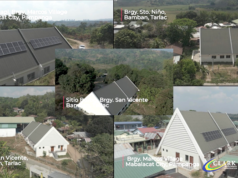CITY OF SAN FERNANDO – Pampanga Gov. Lilia Pineda said on Tuesday the province will pursue the priva-tization of solid waste manage-ment aimed at maximizing public funds and prevention of diseases blamed on poor sanitation caused by the presence of garbage.
Pineda said she and Mayor Oscar Rodriguez of this city earlier met and agreed to work together for the effective and long-term solution to the garbage problem experienced not just in the country but in other nations.
In data obtained recently, Pampanga – excluding the highly urbanized city of Angeles – produces at least 950 metric tons of garbage per day.
Pineda said the privatization will be done on a “per town, per city” basis to prevent control of one entity and give local government units free hand in choosing their respective private firm to handle their solid waste.
Rodriguez, who met Pineda when the governor turned over a P1.9-million garbage truck to the city, said the governor “has some good ideas but nothing concrete yet.”
Pineda asked Rodriguez’s support and assistance in her quest for the permanent and acceptable solution to the garbage problem.
Rodriguez, president of the League of Cities of the Philippines (LCP), said privatization is “okay with, me if feasible and will meet the requirements of the present law.”
Pineda said her priority program on health had been negatively affected by poor sanitation and dirty surroundings caused by the presence of uncollected garbage and the foul smell associated with it.
Pineda cited the case in Malaysia when the “number of diseases decreased” after the country pursued privatization of the collection and management of solid waste.
Pineda said the annual budget of the province and other towns and cities, notably the LGUs with lesser income and budget, could not afford disposing of non-segregated garbage in sanitary landfills. She said her planned privatization will “still focus on segregation of waste at source and tapping of landfills.”
In Apalit, Mayor Oscar “Jun” Tetangco said he had introduced segregation of waste at source in the first class municipality’s 12 villages even before the national government’s strict implementation of Republic Act No. 9003, or the Philippine Ecological Solid Waste Management Act.
He disclosed that the segregation had allowed barangays to earn from garbage to pay for their electric bills for street lamps and reduce the volume of waste transported to sanitary landfills.
But the two-term mayor said that despite their “collective efforts” to reduce the volume of garbage, the municipal government spends at least P15 million yearly. He added that their town produces at least 30 metric tons of garbage daily “on a conservative estimate.”
Tetangco said he will support Pineda’s plan of privatizating the handling of garbage.
The governor’s plan, he added, “is not just feasible but practical and more importantly permanent.”
“The town council can allot at least P10 million compared to what I use now if the private company will handle properly all the waste and collection,” said Tetangco.
Pineda on Monday said she had met town and village officials to discuss the issues on the privatization of solid waste management.
“We will exert all efforts to get the pulse and opinions of the general public before we finally decide with the planned privatization.
And of course we will seek the support of Vice Gov. Yeng Guiao and the rest of the board members,” said Pineda in the dialect.
Pineda said she had asked the Department of Environment and Natural Resources’ (DENR) Environment Management Bureau (EMB) Regional Director Lormelyn Claudio to help in the proper implementation of the planned privatization and the aggressive efforts of the province to implement segregation of waste at source.




